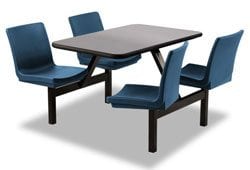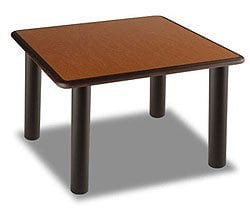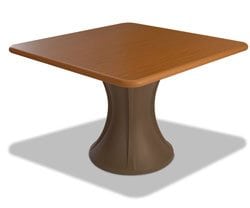Selecting Behavioral Healthcare Tables for Your Facility
You may already have tables in use, but aren’t sure they meet the operational requirements of your Behavioral Healthcare facility. Or perhaps you are tasked with selecting furniture and want to make an informed decision. Design is important, but you also want furniture that works hand in hand with your programming, safety and security protocols. And with today’s strained operating budgets, you don’t have the luxury of purchasing new furniture to replace under-performing tables in your demanding environment. If any of these scenarios sound familiar, use the tips below when selecting tables for your behavioral healthcare facility.
Match the Table to the Application
 First, identify the functional requirements based on the application. For dining tables, you may require fixed seating options – perhaps with swivel seats. Or, tables with separate chairs for a more residential approach in the dining hall.
First, identify the functional requirements based on the application. For dining tables, you may require fixed seating options – perhaps with swivel seats. Or, tables with separate chairs for a more residential approach in the dining hall.
In dayrooms and common areas – you may want loose tables and chairs for programming flexibility and ease of floor maintenance. Or, your environment may call for tables to be floor anchored. Your room layouts will dictate whether rounds, squares or rectangles make the best use of available space.
Norix Furniture offers multiple table options that are designed and engineered for the hard-use that furniture must endure in behavioral healthcare facilities. Norix tables are made of extremely durable materials and come in colors and finishes that can actually promote the healing process.
Norix Solutions: Oasis™ Cafeteria Table (shown in photo), Madera™ Leg Style Tables, Madera™ Fixed Seating Tables, Madera™ X-Base Tables, Forté Café Table and more.
Sanitary Considerations
 Biosafety is a primary consideration for healthcare settings. The furniture you select should also work hand-in-hand with your infection control protocols. Many tables found in healthcare facilities have tops that are produced with vinyl edges that are tacked or glued into a groove that is routed around the circumference of the table top. Through wear or deliberate mischief, this type of edge can separate from the core and laminate surface, thus creating a collection point for dirt, bacteria and pathogens. Ideal table surfaces for healthcare facilities should be produced entirely from seamless composite surface material, metal, or from a core with laminate surface and a permanently-fused molded edge. These horizontal surfaces can then be easily sanitized with hospital-grade cleaners.
Biosafety is a primary consideration for healthcare settings. The furniture you select should also work hand-in-hand with your infection control protocols. Many tables found in healthcare facilities have tops that are produced with vinyl edges that are tacked or glued into a groove that is routed around the circumference of the table top. Through wear or deliberate mischief, this type of edge can separate from the core and laminate surface, thus creating a collection point for dirt, bacteria and pathogens. Ideal table surfaces for healthcare facilities should be produced entirely from seamless composite surface material, metal, or from a core with laminate surface and a permanently-fused molded edge. These horizontal surfaces can then be easily sanitized with hospital-grade cleaners.
Norix Solutions: Madera™ Leg Style Tables (shown in photo), Madera™ Fixed Seating Tables, Madera™ X-Base Tables, Forté Café Table and more.
Built-In Safety and Security
 Beyond sanitary considerations, tables in a behavioral healthcare environment must have robust structural integrity and design features to ensure safety of patients and staff. First, the table should be designed and constructed in such a way to prevent patients from moving the table to create a barrier, or breaking it apart to create a weapon. This is accomplished by robust construction with durable materials, and the secure attachment of base and top components with tamper-resistant hardware. To hinder movement, the table can be weighted or anchored to the floor. Molded edges with a rounded profile, rounded corners and laminate surfaces are preferable for behavioral healthcare environments. Norix offers a specially designed tabletop with a molded edge that is permanently pressure-fused to the core to inhibit contraband, and prevent disassembly of components.
Beyond sanitary considerations, tables in a behavioral healthcare environment must have robust structural integrity and design features to ensure safety of patients and staff. First, the table should be designed and constructed in such a way to prevent patients from moving the table to create a barrier, or breaking it apart to create a weapon. This is accomplished by robust construction with durable materials, and the secure attachment of base and top components with tamper-resistant hardware. To hinder movement, the table can be weighted or anchored to the floor. Molded edges with a rounded profile, rounded corners and laminate surfaces are preferable for behavioral healthcare environments. Norix offers a specially designed tabletop with a molded edge that is permanently pressure-fused to the core to inhibit contraband, and prevent disassembly of components.
Norix Solutions: Forté Occasional Table with Laminate Top (shown in photo), Madera™ Leg Style Tables, Madera™ Fixed Seating Tables, Madera™ X-Base Tables, Forté Café Table and more.
Additional resources
Norix full line of General Healthcare Furniture
Norix’s full line of Behavioral Healthcare Furniture
White Paper: Planning and Design of Behavioral Healthcare Facilities
Project Case Study Download – Mercy Hospital, Miami FL
Norix Furniture Design Brochure
Dustin Coleman is a brand journalist for Norix Furniture and a contributor to the Safe Environments blog.